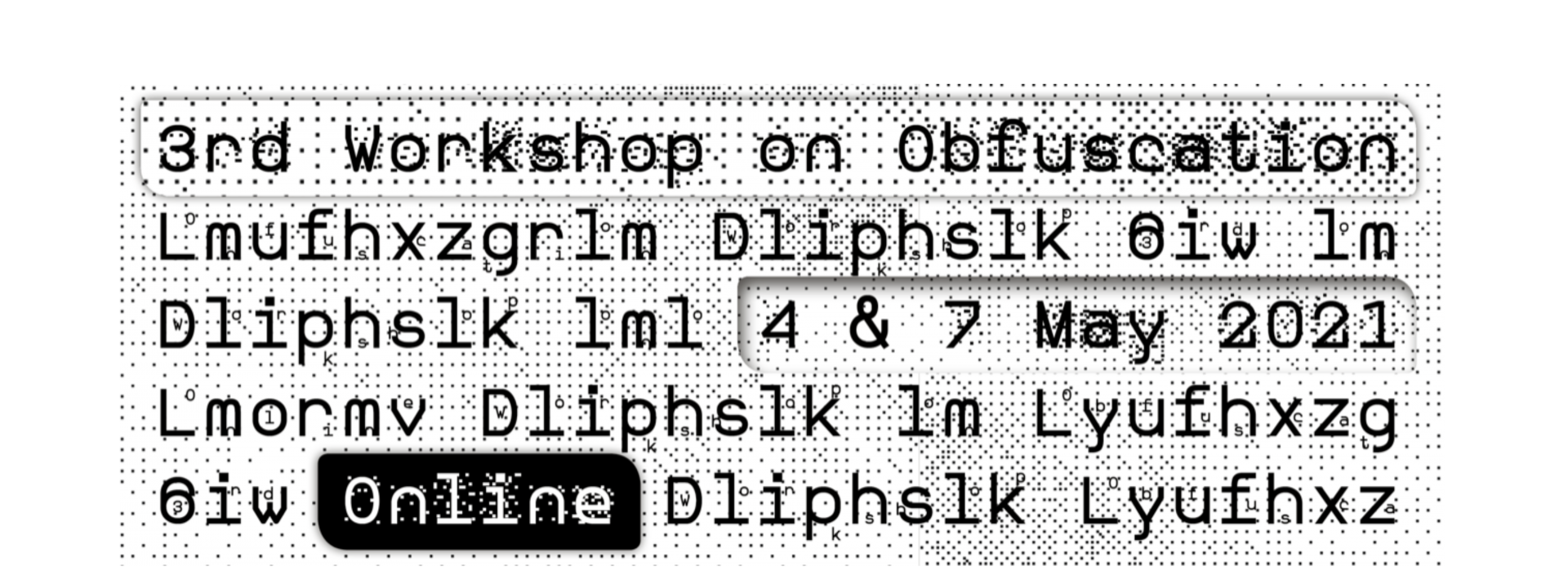Call for participation
We regrettably inform you that we have decided to postpone the 3rd Workshop on Obfuscation because of growing concerns and constrictive measures around COVID-19 that increase uncertainties around travel conditions. We plan to reschedule the workshop for later in 2020.
At this moment in time we do not know the precise dates on which the workshop will be rescheduled. If you would like to withdraw a submission, know that you can do so by logging in to EasyChair. If, on the contrary, you would still like to join us later this year, we will keep your submission and inform you about the new date soon. Know that we will keep the system open for submissions until further notice, so you can edit or withdraw your submission at any time.
We apologise for this inconvenience, but we hope that you understand that we take this decision to ensure a safe and pleasant workshop for everyone.
Further updates will be published on our website and through other channels.
We are pleased to announce an open call to the 3rd Workshop on Obfuscation, taking place May 11-12, 2020 at Delft University of Technology (Delft, the Netherlands).
Obfuscation strategies in the digital domain offer creative ways to evade surveillance, protect privacy, improve security by adding, rather than concealing data, with the intention of making data more ambiguous and difficult to exploit. As the digital expands into the physical, the human and the non-human, we find obfuscation also in decision-making, moral choices, coalition-making and novel forms of resistance to the increasing use of optimization in managing our every day lives.
The aim of this workshop is to foster interaction among diverse communities of research and practice interested in obfuscation. In previous sessions, the workshop focused on obfuscation as the art and science of privacy protection in contexts where actions are being monitored and analyzed by humans, organizations, or information technologies. With this new workshop we aspire to broaden the scope to think of other ways in which obfuscation may (or may not) come to serve people in situations of power asymmetries. We especially would like to include topics like adversarial machine learning, protective optimization technologies (POTs), as well as obfuscation in behavioral decision-making contexts by humans and artificial agents.
This interdisciplinary workshop convenes researchers, scientists, policy makers, developers, journalists, activists, artists and other interested parties to discuss a broad range of approaches to obfuscation, including tools, simulations and experimental methods for people to obfuscate themselves and their environments in asymmetries of power and information.
We welcome two types of participation:
Participation with submission:
- A 2-page position paper on work in progress (references not included in the page limit) OR
- A 1-page description of an interesting use case to be discussed at the symposium (this may be an academic or policy/practice-based case) OR
- A 2-page description of a demo, exhibit, art project (in any media) or journalistic piece relevant to the topic of obfuscation OR
- A 1-page description of hands-on workshops or other interactive formats focusing on obfuscation
Papers must be written in English. Participants are encouraged to submit their proposals in PDF. Please submit your proposals here.
Submissions will be peer-reviewed by the workshop’s Organizing Committee and accepted based on relevance and potential to contribute to workshop discussions and goals. Please note that those with accepted proposals are still required to register for the workshop.
Participation without submission:
If you’re interested in attending without a submission, please note that we have a limited number of seats which will be distributed on a first come first serve basis.
Registration fees:
Registration is €75 for the general public and €25 for students.
Stipends, registration fee waivers and honoraria:
A limited number of stipends are available for those participating with a submission.
If you need financial support, please indicate with your submission.
Fee waivers can be requested by sending an email to obfuscation@esat.kuleuven.be.
In keeping with the Workshop on Obfuscation tradition of supporting artitsts and independent researchers, those selected for participation in the workshop will receive an honorarium (€1,000 max) and material costs (€200 max).
The workshop will not publish formal (i.e. archival) proceedings. Instead, the workshop aims to foster discussion and feedback to improve work-in-progress for subsequent publication elsewhere. With author’s permission, accepted submissions will be posted on the website, but will not be considered archival publications.
IMPORTANT DATES
- Registration re-opens on:
February 20, 2020TBA - Submissions due:
March 6, 2020TBA - Notifications:
March 20, 2020 - Workshop dates:
May 11-12TBA
For any questions, comments or requests, you can reach us at obfuscation@esat.kuleuven.be.
Please feel encouraged to share this call in your circles. Looking forward to receiving your submissions and seeing you at the workshop.
ORGANIZING COMMITTEE
Ero Balsa (KU Leuven)
Caspar Chorus (Delft University of Technology)
Seda Gürses (Delft University of Technology)
Helen Nissenbaum (Cornell Tech)
Sponsored by:



Organizing committee:
Ero Balsa (KU Leuven)
Caspar Chorus (TU Delft)
Seda Gürses (TU Delft)
Helen Nissenbaum (Cornell Tech)



